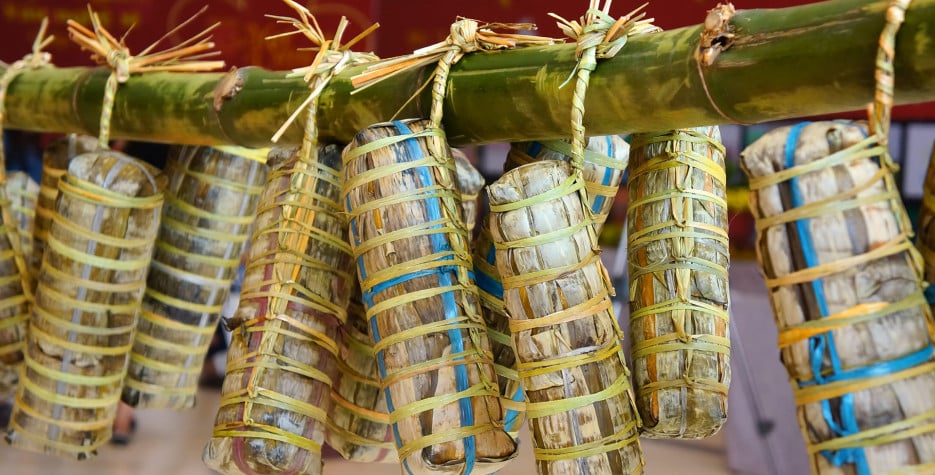Tet is the Vietnamese New Year and is the most important festival and public holiday in Vietnam.
An example of Tet being the definitive Vietnamese holiday is that 'Tet' itself means 'festival' and is the shortened version of 'Tết Nguyên Đán', which is Sino-Vietnamese for 'Feast of the First Morning of the First Day'.
When is Tet?
Tet falls on the first night of the new moon in the first month of the Lunar Calendar, which in the Gregorian calendar usually takes place between the last week of January and the third week of February.
The specific days taken as public holidays will depend on how the dates fall over a weekend, and extra days may be declared holidays to bridge to weekends. Under the Labour Code, employees are given five days off from work and since 2010, the government has allowed the exchange of working days and days off so that the holidays can be longer and bridge weekends.
Tet is celebrated on the same day as Chinese New Year, though as there is a one-hour time difference between Vietnam and China, this can sometimes result in alternate calculations of when the new moon occurs.
Tet signifies the beginning of the year and also traditionally marks the first day of spring.
At the start of the Tet festival, Ong Tau, the god of the Hearth goes to the abode of the Jade Emperor to give his annual report on family members. People are keen that Ong Tau makes a favourable report so before his departure, houses are thoroughly cleaned or even renovated.
Hanging paintings to decorate the home has become a cherished tradition during Tet, the biggest national holiday in Vietnam. Dong Ho folk paintings, with their vibrant colours, diverse genres, and messages of prosperity, are often the top choice for Tet decorations.
A key part of the celebrations of Tet is that it is a chance to begin again, to forget about the problems of the previous year and start afresh. In addition to cleaning homes, people will buy more new clothes at this time of year and it is also a popular time for people to change jobs or switch careers.
On top of the new start, Tet also sets the tone for the coming year so popular customs include family reunions, giving money to children and the elderly, ancestor worship, and wiping out debts.
At midnight at the start of the New Year, Ong Tau returns and is welcomed back with fireworks and gongs. During this time, people will avoid bad thoughts or arguments in case they allow bad spirits into the house.
Tet is also when everyone in Vietnam becomes one year older as age is traditionally determined by the new year and not by each person's birthdays.
A popular event to mark new year is Flower Street in Ho Chi Minh City, which attracts over one million visitors each year. The animal of the new year will be displayed along with many flowers.
The most popular food of the festival is banh chung (banh tet), which is made of sweet sticky rice, meat or beans, and spices wrapped in a leaf and boiled for half a day. The legend is that this delicacy was invented over two thousand years ago by a prince in the Hung dynasty and the king was so impressed by the simplicity and humbleness by this gift that he named the prince as his heir.
Tet is a quieter and less dangerous festival than it used to be as firecrackers were banned in 1995. Instead, major cities now hold organised fireworks displays to provide an explosive aspect to the holidays.
During Tet, the cities become less busy as people return to their hometowns to be with friends and family and many businesses are closed.
If you are visiting Vietnam at this time of year, be aware that most of the country will close down for Tet, local transport services are stretched to the limit and international flights are very busy catering for Vietnamese people returning home from overseas for Tet.
Working in Vietnam over Tet
Employers who require employees to work during the Tet holiday must pay three times the normal wages. A customary Lunar New Year bonus, also known as a Tet bonus, is often paid to employees before their leaving for the Lunar New Year holiday. The amount of the Tet bonus will depend on both the company and employee performance.
The Tet Offensive
Probably the most common understanding of Tet outside of Vietnam is in relation to the Tet Offensive that happened during the Vietnamese War.
During the war, a truce had been established during the Tet holidays. On 31 January 1968, the truce was broken by North Vietnam and the National Liberation Front forces when they launched a surprise attack on over 100 cities in South Vietnam. The attacks made little in the way of strategic gains but the ferocity of the attacks was seen as a key turning point in the United States public opinion about the participation of their country in the conflict.


